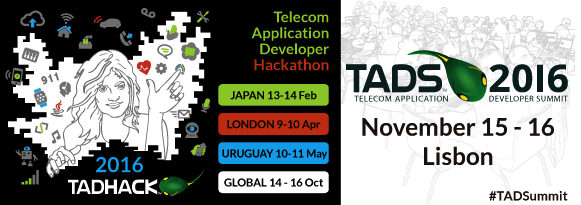 At the recent IIT RTC Conference I gave a couple of presentations on TADHack Global and on the difference between Telecom and Telco.
At the recent IIT RTC Conference I gave a couple of presentations on TADHack Global and on the difference between Telecom and Telco.
The first was a summary of what we achieved with TADHack Global. You can read all about the event and winners in this weblog. It was the world’s largest global hackathon over one weekend, we were even tested the limits of YouTube with the volume of content we were creating. In the presentation I explained how telecom app development is pervasive, Uber and Airbnb do it. The whole category of on demand services is built on telecom app development. That is, connecting people and web-based or internet-based services. People are where the cash is, hence the massive wealth creation we’ve seen. I highlighted the prejudice that exists with the word telecoms, but the internet has democratized it so anyone can use it. And TADHack is a global showcase of the amazing examples of what is possible using telecoms.
We then had 3 of the TADHack Chicago hacks demonstrate the talent and innovation possible: Grocery Go, Outsider, and Implantation. A comment often made to me by people worried about taking part in TADHack is, ‘but I don’t have innovative ideas.’ My answer is always the same, ‘Do you have problems in your life?’ to which the answer is always yes, lots of them. Then focus on using the TADHack sponsor’s technology to solve one of those problems. Uber was built out of a frustration in how bad taxi services are around the world. Airbnb out of the frustration of all the rooms available but unused in cities, so we had to pay extortionate hotel rates for rooms. Its solving problems that drives hacks, and there are problems everywhere around the world.
I finished on explaining how TADHack, TADMentor, and TADSummit fit together. TADHack is a global showcase of talent and ideas. TADMentor tries to help the talent and ideas get implemented, funded, and to market. And TADSummit provides a business focused thought-leadership event sharing best practices and the latest innovations to help move the whole telecom app development industry forward.
In my second presentation, shown below, I had some fun in highlighting that the words Telecom and Telco are different. I gave lots of examples of how the democratization of telecoms is enabling a DIY (Do It Yourself) movement across enterprises and services providers in solving problems. All based on telecom app development. I then highlighted the challenges Telcos (network operators) have faced in harnessing this movement.
In summary: Telecoms is becoming democratized by open / closed source platforms and APIs. Telecoms and the web continue to merge and evolve, Telecoms can not be viewed in isolation to the web. DIY in telecoms is on the rise, Telcos’ customers are doing it themselves. Discovery of this DIY possibility comes from people talking to people and publishing vertical industry solutions. Channels for delivering these innovations are on the rise as Apple/Android app stores pass their peak. Its within platforms like Slack, LINE, WeChat (so called application to person); and at the edge of networks and on devices other than smartphones (IoT).
I highlighted that technologies are moving fast, and the decentralized web will have a significant impact on telecoms, the web, and telcos. TADHack shows innovation is everywhere, in solving local problems. The skill for telcos is finding their role in the emerging landscape – it is localized. What Dialog in Sri Lanka has achieve is not directly addressable AT&T and Verizon. The focus should be on where Telcos can create and/or deliver unique value within their country’s ecosystem.
During the discussion the Telco thought-police came out and pointed out that customers expect 5 9s and only they can deliver it. Google can get away for ‘sorry we’re down, come back later.’ Telcos can not. This is a fallacy, telecom networks are unavailable to their customers quite often. In my personal experience we had no cellphone coverage when our son was going into anaphylactic shock from a bee sting just 5 minutes from home. Not-spots are a big political issue in the UK at the moment. Customers do not experience 5*9s, ever. However, the decentralized web could in time address this for emergency services, but that’s another discussion.
The other gem that came from the Telco thought-police was “we will see” on whether customers prefer apps for communications to telco services. This shocked me given Whatsapp’s impact on SMS around the world, and the general decline in telcos’ voice minutes in most developed markets.
Let’s be frank, IMS is too complex, VoLTE roaming still is not here to the shame of the industry. However, there are lots of context specific high definition voice alternatives. I’ve pointed out the need for simplification in IMS and RCS for years. 5G is mostly wishful thinking, given the weather issues in some of the bands. 5G’s dominant use case will be solving the dense cell issues (small link lengths so weather issues are less significant) given everyone’s ever-increasing data needs. We’ll have to wait until at least 6G for many of the 5G use cases.
Telcos need to break with the belief system built around: 9*5s defines everything, standards are the only way to deliver telecom services, and only a small select group of large vendors can serve their needs. Come to TADSummit and meet the people who are showing today how Telecom, Web and Telcos can solve the many challenges we face, by rethinking what it takes to build networks and services. Check out the TADSummit agenda, its the thought-leadership event in Telecoms.